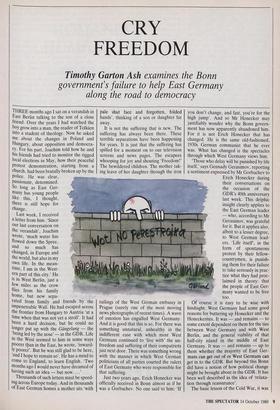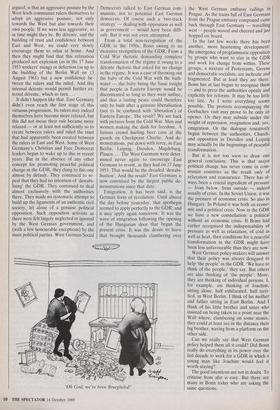CRY FREEDOM
Timothy Garton Ash examines the Bonn
government's failure to help East Germany along the road to democracy
THREE months ago I sat on a verandah in East Berlin talking to the son of a close friend. Over the years I had watched the boy grow into a man, the reader of Tolkien into a student of theology. Now he asked me about the changes in Poland and Hungary, about opposition and democra- cy. For his part, Joachim told how he and his friends had tried to monitor the rigged local elections in May, how their peaceful protest demonstration, starting from a church, had been brutally broken up by the police. He was clear, passionate, determined. So long as East Ger- many has young people like this, I thought, there is still hope for change.
Thousands of such letters must be speed- ing across Europe today. And in thousands of East German homes a mother sits 'with pale shut face and forgotten, folded hands', thinking of a son or daughter far away.
It is not the suffering that is new. The suffering has always been there. These terrible separations have been happening for years. It is just that the suffering has spilled for a moment on to our television screens and news pages. The escapees whooping for joy and shouting 'Freedom!' The bewildered children. The mother tak- ing leave of her daughter through the iron railings of the West German embassy in Prague (surely one of the most moving news photographs of recent times). A wave of emotion has engulfed West Germany. And it is good that this is so. For there was something unnatural, unhealthy in the indifferent ease with which most West Germans continued to 'live with' the un- freedom and suffering of their compatriots just next door. There was something wrong with the manner in which West German politicians of all parties courted the rulers of East Germany who were responsible for that suffering.
Just two years ago, Erich Honecker was officially received in Bonn almost as if he was a Gorbachev. No one said to him: 'If you don't change, and fast, you're for the high jump'. And so Mr Honecker may justifiably wonder why the Bonn govern- ment has now apparently abandoned him. For it is not Erich Honecker that has changed. He is the same old-fashioned, 1930s German communist that he ever was. What has changed is the spectacles through which West Germany views him.
`Those who delay will be punished by life itself,' says Gennady Gerasimov, reporting a sentiment expressed by Mr Gorbachev to Erich Honecker during their conversations on the occasion of the GDR's 40th anniversary last week. This delphic insight clearly applies to the East German leader — who, according to Mr Gerasimov, was grateful for it. But it applies also, albeit to a lesser degree, to West German lead- ers. 'Life itself', in the form of spontaneous protest by their fellow- countrymen, is punish- ing them for their failure to take seriously in prac- tice what they had proc- laimed in theory: that the people of East Ger- many wanted to be free too.
Of course it is easy to be wise with hindsight. West Germany had some good reasons for buttering up Honecker and the Honeckerites. It was — and remains — to some extent dependent on them for the ties between West Germany and with West Berlin, and the general viability of that half-city island in the middle of East Germany. It was — and remains — up to them whether the majority of East Ger- mans can get out of or West Germans can get in to the GDR. But beyond this Bonn did have a notion of how political change might be brought about in the GDR. It has been well described as the idea of 'relaxa- tion through reassurance'.
The basic lesson of the Cold War, it was argued, is that an aggressive posture by the West leads communist rulers themselves to adopt an aggressive posture, not only towards the West but also towards their own people. If we were less aggressive, so in time might they be. By détente, and the building of trust and confidence between East and West, we could very slowly encourage them to relax at home. And then they might find that this relaxation produced not explosion (as in the 17 June 1953 workers' rising) or defection (as up to the building of the Berlin Wall on 13 August 1961) but a new confidence be- tween the rulers and the ruled. And this internal détente would permit further ex- ternal détente, which in turn....
It didn't happen like that. East Germany didn't even reach the first stage of this virtuous progression. Its rulers may indeed themselves have become more relaxed, but this did not mean their rule became more relaxed — or at least not sufficiently so to create between rulers and ruled the trust that had apparently been created between the rulers in East and West. Some of West Germany's Christian and Free Democrat leaders began to wake up to this in recent years. But in the absence of any other concept for promoting peaceful political change in the GDR, they clung to this one almost by default. They continued to re- peat that they had no intention of 'destabi- lising' the GDR. They continued to deal almost exclusively with the authorities there. They made no systematic attempt to build up the ligaments of an authentic civil society, let alone of a genuine political opposition. Such opposition activists as there were felt largely neglected or ignored by the West German government, and (with a few honourable exceptions) by the main political parties. West German Social Democrats talked to East German com- munists, not to potential East German democrats. Of course such a 'two-track strategy' — dealing with opposition as well as government — would have been diffi- cult. But it was not even attempted.
From a total non-recognition of the GDR in the 1950s, Bonn swung to an excessive recognition of the GDR. From a Cold War rhetoric demanding complete transformation of the regime it swung to a détente rhetoric that asked for no change in the regime. it was a case of throwing out the baby of the Cold War with the bath- water — the baby being the basic insight that people in Eastern Europe would be discontented so long as they were unfree, and that a lasting peace could therefore only be built after a genuine liberalisation (not to be confused with 'liberation') of Eastern Europe. The result? We are back with pictures from the Cold War. Men and women making the dash for freedom. A furious crowd hurling beer cans at the guards on Checkpoint Charlie. And de- monstrations, put down with force, in East Berlin, Leipzig, Dresden, Magdeburg, Plauen.... The West Germans were deter- mined never again to encourage East Germans to revolt, as they had on 17 June 1953. That would he the dreaded 'destabi- lisation'. And the result? East Germany is now convulsed by the largest public de- monstrations since that date.
Emigration, it has been said, is the German form of revolution. Until almost the day before yesterday, that apothegm seemed to apply perfectly to the GDR; and it may apply again tomorrow. It was the wave of emigration following the opening of the Hungarian door that began the present crisis. It was the desire to leave that brought thousands clambering over 'Oh God, we've been Bruegheled!' the West German embassy railings in Prague. As the trains full of East Germans from the Prague embassy compound came back through East Germany — travelling west — people waved and cheered and just hopped on board.
In the last few weeks there has been another, more heartening development: the emergence of programmatic opposition by groups who want to stay in the GDR and work for change from within. These groups, a mixture of Protestants, Greens and democratic socialists, are inchoate and fragmented. But at least they are there. Bonn has at last begun to recognise them — and to press the authorities openly and explicitly for reforms. It may be too little too late. As I write everything seems possible. The protests accompanying the Gorbachev visit may prove to be only an opener. Or they may subside under the weight of repression, resignation and, yes, emigration. Or the dialogue tentatively begun between the authorities, Church, and opposition in Dresden and Leipzig may actually be the beginnings of peaceful transformation.
But it is not too soon to draw one general conclusion. This is that major political change has never come in com- munist countries as the result only of relaxation and reassurance. There has al- ways been a crucial ingredient of pressure — from below, from outside — indeed usually of crisis. In the Soviet Union, it was the pressure of economic crisis. So also in Hungary. In Poland it was both an econo- mic and a political crisis. Now in the GDR we have a new constellation: a political without an economic crisis. If Bonn had earlier recognised the indispensability of pressure as well as relaxation, of cold as well as heat, then conditions for a peaceful transformation in the GDR might have been less unfavourable than they are now.
West German policy-makers will answer that their policy was always designed to help 'the people' in the GDR. 'We have to think of the people,' they say. But others are also thinking of 'the people'. More, they are thinking of individual persons. I, for example, am thinking of Joachim, sitting alone, half exhilarated, half terri- fied, in West Berlin. I think of his mother and father sitting in East Berlin. And I think of his little brother and sister who insisted on being taken to a point near the Wall where, clambering on some stones. they could at least see in the distance their big brother, waving from a platform on the other side.
Can we really say that West German policy helped them all it could? Did Bonn really do everything in its power over the last decade to work for a GDR in which a young man like Joachim would feel it worth staying?
The good intentions are not in doubt. To criticise from afar is easy. But there are many in Bonn today who are asking the same questions.



























































 Previous page
Previous page